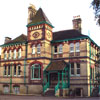News & Events
 |
BNSS HQ Bournemouth |
New Professionals Conference for Museums Masters students
Tuesday 24th October 2006 Bournemouth University 10.00am 3.30pm
A gathering and presentation of current research and thinking from Museum Studies masters students. This student led event, supported by Museum Studies staff in the Archaeology and Historic Environment Group, School of Conservation Sciences at Bournemouth University, will be held at the Bournemouth Natural Science Society, 30, Christchurch Road, Bournemouth, BH1 3NS.
- A platform for Museum Studies students to present their research
- A networking opportunity for Museum Studies Students : museum professionals and museum and collections enthusiasts
- Free admission to book email: rdolling@bournemouth.ac.uk
New Professionals Conference attendees have been invited to tea at the Museums Association Conference and to attend the MA conference session led by;
Maurice Davies, MA Deputy Director
‘The Tomorrow People: entry into the museums profession’, at the Pavilion from 4.15 – 5.45.
This will be followed by a drinks reception at 6pm.
The New Professionals Conference
Papers : Extracts
Jo Elsworth
The Theatre Collection: a University Museum in a time of change
The University of Bristol Theatre Collection is a fully registered museum and the UK’s second largest theatre history archive. This paper takes a brief look at the challenges and, sometimes conflicting, priorities facing the Theatre Collection and examines how it has responded to them. This includes meeting the research and teaching needs of the University whilst balancing that with the curatorial needs of collection that now includes multimedia and e-media archives. Other challenges include Accreditation, developing accessibility and planning for future redevelopment.
Lesley Meaker
Arts in health: curating their collections
ArtCare is a charitably funded art service at Salisbury District Hospital providing access to participatory and visual arts to staff, patients and visitors. Over the past 15years the Trust has built up a collection of mainly contemporary artworks including photographs, paintings, textiles, external sculptures and integral architectural works. This paper shall discuss the relationship between healthcare and curating a collection of permanent artworks and temporary exhibitions.
Dan Miles
The Municipal Museum of Villajoyosa and its role as a “museo local” in the community
Since its opening in 1996, the Municipal Museum of Villajoyosa has become an integral part in the community as a centre of learning and a focal point for celebrating and representing the culture and heritage of the local area. The museum has dedicated itself to learning, education and research but, probably its most important impact has been the bringing to light to the local people of their archaeological and ancient historical heritage. The museum has also carried out a number of social history projects and campaigns which have highlighted to the local community the importance of recording, saving and celebrating the local traditions and experiences of their parents and grandparents.
Hannah Paddon
Natural History collections: trends and uses.
Natural history collections and galleries are an essential part of many modern museums. They can be considered educational, informative, entertaining and, above, all totally enthralling to visitors. So why has little attention been paid to these collections in recent years? The surprising lack of modern literature, focusing on the display and interpretation of natural history collections, lead me to examine this topic for my Masters dissertation. Considering the display and interpretation of natural history collections from the Victorian period through to the present day, the study combined both focused research on ‘case study museums’ in the South West of England with an overview of British museums. My forthcoming PhD research ‘the use of biological collections in British museums’ will examine
The importance of natural history collections and the issues facing their continued presence in British museums.
Doug Price
The Witte Memorial Museum: Remains of the Past
The George Witte Memorial Museum in San Antonio, Texas has undergone sweeping changes over the years. The most significant of these changes occurred in the second half of the last century, yet the repercussions of those times can be felt by the new face arriving at the respected institution. The characters of the Witte’s past incarnations have remained as ghosts for new employees to discover.
Michael Wighton
Wish You Were Here? Hidden disabilities & museum access
The problems faced by those with hidden disabilities and how museums can help with the challenges of stigma & discrimination, social exclusion, negative media opinions. Museums building bridges between the socially excluded and the community through outreach groups, volunteer work, exhibits on mental health, education. Is it feasible?
The conference is free and booking is essential please contact Rebecca Dolling in the School of Conservation Science to book your place.
10/10/06
